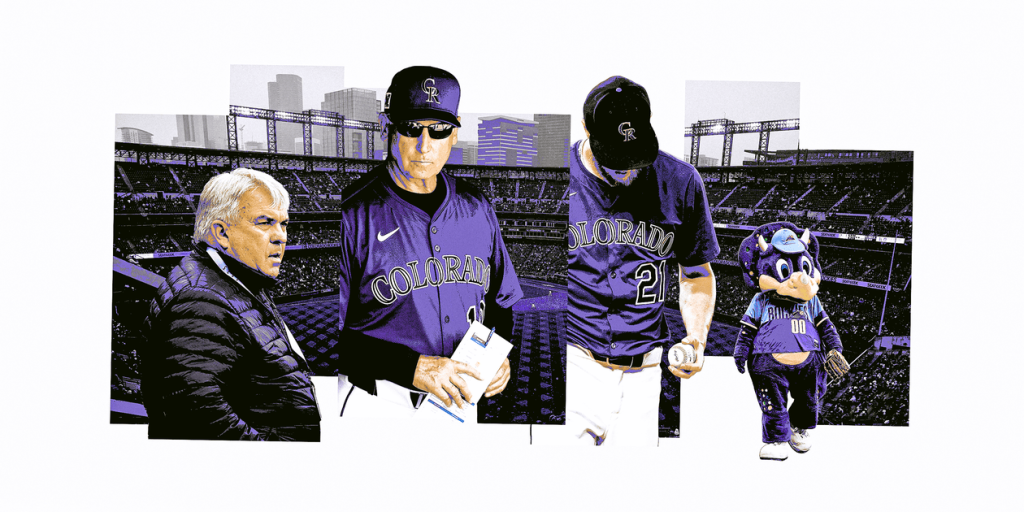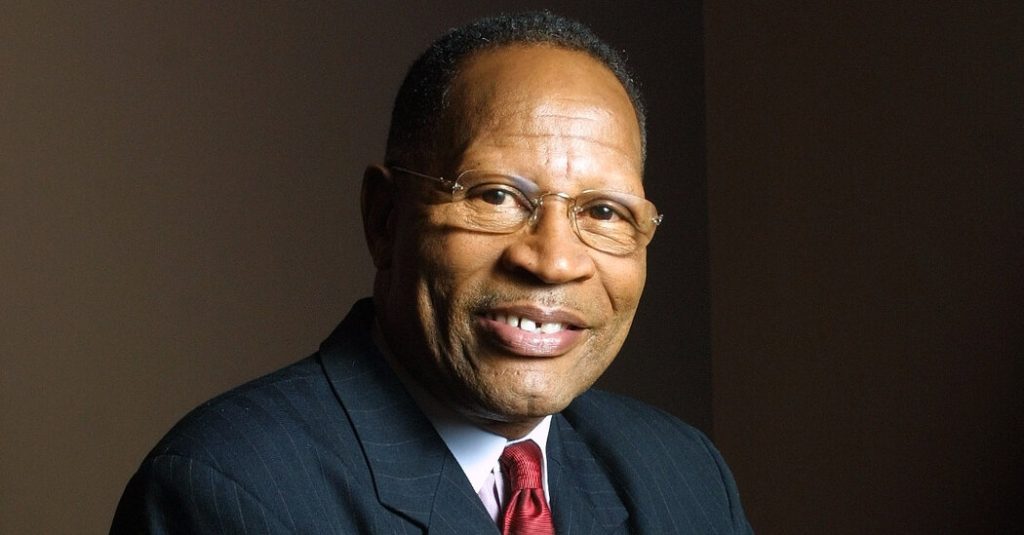DENVER — The Rooftop Bar at Coors Field is nearly 1 mile above sea level. Up here, you will find a center-field angle of the action, and a bird’s eye glimpse at the Denver cityscape and the picturesque Rocky Mountains in the distance.
The setting is part of what keeps people filing through the gates of Coors Field, even to watch a Colorado Rockies team that has never won its division, a franchise with only nine winning seasons in 32 years of existence. Win or lose, people have long shown up to Coors Field in great numbers. Some are diehard fans. Some are transplants or out-of-towners supporting visiting teams. Many are simply here for the vibes. One recent evening, Rockies fan Ryan Mack stood on the rooftop terrace, clad in a Trevor Story jersey, overlooking a glorious ballpark.
“How can you beat this?” Mack said, raising his right arm toward the sky. “Sunshine and baseball. You can’t beat it.”
Yet these Rockies are testing just how far those good vibes go. The team is off to a historically brutal start, at 7-33. Only the 1988 Baltimore Orioles staged a worse start through 40 games. Should the Rockies’ losing pace continue, they would surpass last season’s Chicago White Sox for the most losses in modern baseball history.
Perhaps the strangest part? So far, at least, the fans are still coming, enjoying the mountain setting that is an inescapable fact of the Rockies’ existence. Reminders adorn T-shirts in the team store. Baseball with an altitude. The Rockies’ chief quirk both aids the franchise’s greatest strength — that remarkably consistent attendance — and creates its tragic flaw, the difficulty of pitching and performing in the mountain air. If Wrigley Field exists as a timeless neighborhood bar, Coors Field thrives as a tranquil biergarten. The Rockies rank 19th in attendance with an average of more than 25,000 tickets sold per home game; that steady crowd supports business — and business as usual —regardless of whether the product on the field is stellar or atrocious.
But at long last, this club is facing deeper existential questions bubbling like the ice-cold beer that gives this park its namesake.
The Rockies have lost 94, 103 and 101 games, respectively, in the previous three seasons and this year’s situation suggests the Rockies have finally reached rock bottom. Sunday — a day after one of the ugliest losses in Coors Field history — the club took action, firing manager Bud Black and bench coach Mike Redmond. Warren Schaeffer, formerly the team’s third-base coach, is now interim manager.
Perhaps all this losing is finally enough to unravel the franchise’s mountaintop peace.
“Our play so far this season, especially coming off the last two seasons, has been unacceptable,” owner Dick Monfort said in a statement released Sunday. “Our fans deserve better, and we are capable of better. While we all share responsibility in how this season has played out, these changes are necessary. We will use the remainder of 2025 to improve where we can on the field and to evaluate all areas of our operation so we can properly turn the page into the next chapter of Rockies baseball.”
For the Rockies, firing the manager is a significant moment. Schaeffer is only their eighth manager since the team’s debut in 1993; the Miami Marlins, who joined the league alongside it, have had 17 in that time. But will changing managers actually get at the root of what ails this franchise?
Rockies general manager Bill Schmidt sat on a bench last week and leaned against the wall in the team’s home dugout. Underneath a gray sky, he assessed the early season wreckage.
“Needless to say we’re not happy with where we stand,” Schmidt said. “We feel for our loyal fans who care about us and the players, staff, front office, people that work here. There’s a lot of people that care.”
There is no market quite like the one Schmidt works in. Colorado both supports its baseball team and exists as an odd western outpost in MLB’s landscape. Coors Field is simultaneously a breathtaking place to watch a baseball game and a challenging venue in which to build a team. Anyone who understands the Rockies practically rolls their eyes at another mention of humidors or thin air. It’s a house of horror for pitchers, a difficult place for players to recover, a strange setting that can skew player evaluation.
“It’s easy to sit back, but until you’ve experienced it and really understand what goes into it, these are challenges we have to try to overcome,” Schmidt said.
Adding to the dilemma, these Rockies still battle perceptions of being behind in data and player development. That’s one notion that caused Schmidt to push back.
“We might not have the pure numbers (of analysts) that other people have, but we’ve always looked at analytics,” Schmidt said. “I can go back 30 years ago. I looked at a stat sheet.”

As Schmidt dismissed one outside perception, he brought up another, this one unprompted. In 2021, when Jeff Bridich was still general manager, one rival executive told The Athletic: “They are one of the weirdest front offices to deal with. (We’re) never really close to being on the same page on any concept we talk about. My feeling is they’re very insular.”
The Rockies are the only team in the mountain time zone. The club’s siloed nature is both a geographic fact and a repeated criticism around the league.
“People talk about us being isolated. That’s fine,” Schmidt said. “I wouldn’t say we’re behind the times by any means.”
Bridich is long gone. Under Schmidt, the Rockies have become more active trade partners with other clubs. But as their win total lingers in the basement, the image of the Rockies as baseball loners persists.
“It’s hard to say,” Schmidt said about the origin of this notion. “I can’t answer that for them, where they come up with that perception.”
Schmidt has worked for the Rockies since 1999. Senior scouting director Marc Gustafson has worked for the club since 1993. So has international scouting director Rolando Fernandez. Chris Forbes, the senior director of player development, has been with the organization since 2006. The Rockies pro scouting director is Sterling Monfort, who happens to be the owner’s son.
Before Sunday, the Rockies seemed opposed to earth-shattering changes. But every team has its breaking point.
“We’ve grown,” Schmidt says. “There’s a lot of things that people really don’t know. I know they want to know what goes on here. But there’s a lot of things that go on. There’s a lot of good things, and there’s a lot of good people who work here.”
Even as Schmidt focuses on the good, it’s hard to ignore that the 2025 Rockies have so far endured an awful lot of bad.
The team has a starting rotation ERA of 7.09, almost a full run worse than any other team. There are bright spots in the bullpen, but the ERA there is still 4.12. With a collection of young players on the field, the Rockies ranked as baseball’s third-worst team in defensive runs saved entering Sunday. They have stolen only 18 bases all year. In road games, the Rockies threaten to be one of the worst-hitting teams of all time, carrying a .189 batting average.
Worse, a team that plays in baseball’s most prolific offensive ballpark ranks last in home-game wRC+, the metric that encompasses all offensive performance.
“It’s not fun, man,” third baseman Ryan McMahon said. “Obviously this is what we get paid to do, though. This is how we’ve all been wired our whole lives. Just show up and work, keep playing the game as hard as you can, hoping to make things turn, hoping to get better as a group.”
Schmidt pointed to injuries as one factor important to understand in explaining this nightmarish start. Second baseman Thairo Estrada, signed on a one-year deal with a mutual option this winter, has yet to play after suffering a wrist fracture in spring training. Shortstop Ezequiel Tovar, worth 3.8 bWAR last season, struggled early and went on the IL with a bruised left hip on April 16. Center fielder Brenton Doyle, worth 4.0 bWAR last season, battled through a quad injury in April, then spent six days on the bereavement list.
“We’ve had four shortstops on the IL,” Schmidt said. “Even the guys we brought up from Triple A got hurt. But nobody will feel sorry for you. We owe it to people to help turn this thing around.”
While fans bristle and the front office grapples with young talent that otherwise has not emerged as hoped, the players in the clubhouse are enduring a grim reality every day.
Left-handed pitcher Kyle Freeland is a Denver native. Along with starting pitchers Germán Marquez, Antonio Senzatela and McMahon, he is a remnant of Rockies teams that made the playoffs in 2017 and 2018. Freeland grew up a loyal Rockies fan and understands this market as well as anyone. He watched the team stage a remarkable run to the 2007 World Series. He can still envision Larimer Square lined with purple ribbons and Rockies flags.
“I get to be around Vinny Castilla every single day, which is a dream come true for me, right?” Freeland said. “Right now, not the best lighting for us with how we’ve started this season. But being able to put this uniform on means the world.”

For all the losing, the Rockies clubhouse so far remains a pleasant place. There’s something about that mountain air. Friendly security guards. A friendly staff. Players unafraid to show their human side. But the baseball? It’s been as bad as it gets.
“Yeah man, it sucks,” Freeland said of the start to the season. “I’m one foot in as a player and one foot in as a fan, being from here.”
Sometimes losing teams fold into a snakepit of negativity. Other times, young clubhouses filled with players just thankful to be in the majors remain surprisingly upbeat places. Right now, the Rockies typify the latter.
“You learn a lot about yourself and a lot about your teammates and a lot about your coaches when you’re going through ruts,” Freeland said. “It’s how people respond to adversity and how they come out on the other side. Us veterans … We’re trying to keep these young guys’ heads on a swivel and let them know: ‘Hey, we’re in a tough spot now, but there’s no reason to stop trying to get better.’ ”
Only days before the Rockies fired Black, Schmidt had given the manager a vote of confidence. A former major-league pitcher, the 67-year-old Black was in his 18th season as a big-league manager. Black still seemed to garner the respect of the players. He carried a consistent attitude helpful in a situation as desolate as the Rockies’ start to 2025.
“Same guy every single day,” McMahon said. “The way I explain it to my family, he’s like some SoCal chill guy who just grew up and manages a baseball team.”
But when circumstances become as dismal as they are right now in Colorado, someone has to take the fall. The Rockies had already made a change at hitting coach. In April, the club fired Hensley Meulens and replaced him with Clint Hurdle, another 67-year-old veteran who in another life managed the Rockies for eight seasons, including that 2007 World Series club. Known for his positivity and energy, Hurdle previously worked as a Rockies special assistant and developed relationships as young players rose up the system.
Now with Black and Redmond gone, Hurdle has taken the title of interim bench coach. He will work for Schaeffer, a 40-year-old who has 10 years of experience coaching and managing in the Rockies’ system.

“There’s a ton of adjectives to describe what’s going on,” Black had said only days before his dismissal. “Anger, frustration, pissed off … We all feel it. Those guys feel it because they’re between the lines. Those of us down here in the dugout and the clubhouse, in the trenches, we all feel it.”
More troubling than anything involving coaches, the manager or even the current roster? It remains difficult to decipher the Rockies’ path forward.
For all the losing, the team has never been a true cellar dweller in terms of spending. This year’s Rockies ranked 21st in Opening Day payroll, the franchise’s lowest since 2015. But when the Rockies have spent, they have rarely spent well. Kris Bryant is the latest example, the former MVP for the 2016 curse-breaking Chicago Cubs who raised eyebrows when he signed a seven-year, $182 million deal with the Rockies before the 2022 season. Since the ink dried, Bryant’s production has fallen off the charts. Injuries have plagued him. A player once on a Hall of Fame trajectory has become an afterthought. Now dealing with a degenerative back issue, Bryant has only played 11 games in 2025. Last week, he told a beat writer he was heading to Los Angeles for an ablation procedure that kills nerves with the intent to help eliminate pain in his vertebrae.
“We made the decision (to sign him). I think we made it all for the right reasons,” Schmidt said. “Hopefully before the end of the contract we get some productivity out of him.”
The Rockies will not be able to spend their way out of this hole. Like many organizations in tatters, there are hints of young talent. Early in Schmidt’s tenure, the Rockies tried to fortify their pitching by adding more than 30 arms via trade and the draft. Chase Dollander, the ninth player drafted in 2023, is now in the big-league rotation, likely the best of the bunch. But he has an 8.66 ERA in four starts at Coors Field. After his latest home outing, he talked about battling a mechanical issue, flying open with his lead shoulder. “I was able to be athletic and get the ball in the strike zone,” he said. “Here, that’s not gonna fly. You have to be on your stuff most of the time.” Even in two starts on the road, Dollander has surrendered seven earned runs in 10 1/3 innings.
As for how they will accumulate more talent? Last summer the Rockies selected outfielder Charlie Condon third in the MLB draft. This coming summer, they will pick fourth. But because they had lottery picks in each of the two previous drafts, they will be ineligible to pick any higher than 10th in 2026.
Lost in all the struggles are the many complications of Coors Field. Even if the Rockies were analytical gurus, their environment complicates everything about evaluation. Both hitters and pitchers can be different beasts at home and on the road.
“There are a ton of baseball people who you’ll talk to who will have answers and solutions and, ‘Why don’t they do this?’ and ‘Why don’t they do that?’” former Rockies general manager Dan O’Dowd told MLB.com. “And I’m telling you, until you walk in the people’s shoes who are actually attempting to do it, it’s just really hard to quantify and wrap your arms around.”
The Rockies’ current path appears centered on homegrown talent acquired through both the draft and the international market. But other sources of player procurement — waivers, trades — have not been strengths. That leaves the club subject to the development of young players. This spring, The Athletic ranked Colorado’s farm system 23rd out of 30 teams.
“It’s like having your kids,” Schmidt said. “You can raise them the same. You have multiple kids, but they don’t all mature at the same rate. Same thing when you’re developing players.”
Up on the rooftop Wednesday, one young woman pulled out her phone to snap a picture — not of the scenic view but rather of all the empty seats down below. The day’s announced attendance was 18,855. The number of people in the seats — and the amount of fans actually wearing purple and cheering for the home team — appeared much smaller.
As the woman snapped her photo, a friend uttered: “That’s depressing.”
The Rockies went on to lose to the Detroit Tigers that night in extra innings, their fate all but sealed when left fielder Jordan Beck and shortstop Alan Trejo nearly collided chasing a fly ball in shallow left field. The ball bounced off Beck’s glove, trickled away toward center and allowed another run to score in an eventual 8-6 loss. Rockies fans have seen those kinds of bloopers for 40 games. On this night, chants of “Let’s go Tigers” broke out in the lower bowl of Coors Field.
The next day, Freeland, the Denver native with a deep love for this team and this city, got trounced in the first game of a dismal doubleheader. He surrendered 11 hits and nine runs, five earned, in three innings.
In an interview room after the game, a reporter asked Freeland for his message to the fans. Why should they keep showing up?
Freeland looked down. His voice cracked.
“Keep believing in us,” Freeland said. “Keep riding.”
On Saturday night, the Rockies hit a new on-field low, losing to the San Diego Padres 21-0, tying for the second-largest shutout in modern baseball history, and the worst ever at Coors.
But it was a lovely night in Denver, with temperatures in the low 70s. The attendance? Listed at 38,423, the second-biggest crowd of the season.
(Illustration: Demetrius Robinson / The Athletic; Photos: Rick Scuteri-Imagn Images, Andy Cross / MediaNews Group / The Denver Post, Aaron Ontiveroz / The Denver Post, Dustin Bradford / Icon Sportswire, Justin Edmonds / Getty Images)







